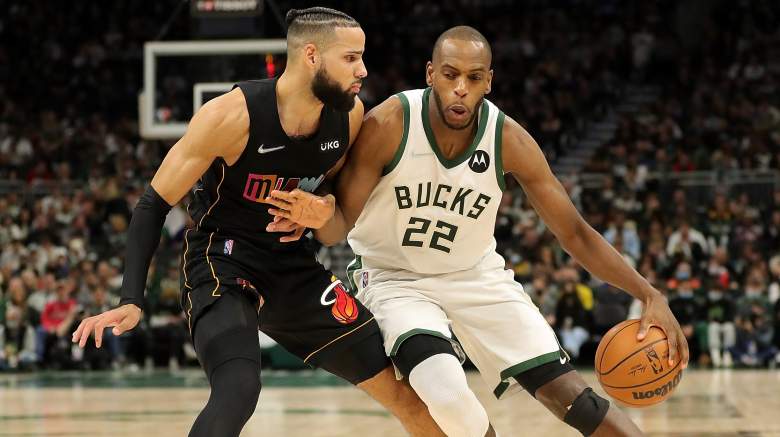
Getty Caleb Martin, left, playing defense for the Heat
For just the sixth time in his 94-game career, Caleb Martin found his way into the starting five in an NBA game. The Heat are already without stars Bam Adebayo and Jimmy Butler and with remaining leading scorers Tyler Herro (3-for-9 shooting) and Kyle Lowry (9-for-21) struggling, Martin had to step up. He did, making nine of the 12 shots he attempted for a whopping 28 points in nudging the Heat to a win over Milwaukee.
In doing so, he got a rare honor—a shout-out—from Lowry, the veteran star point guard, who appreciates the grit with which Martin plays.
“Shoutout to Caleb Martin,” Lowry said. “If he didn’t play that first half, we would have been blown out. His confidence is growing. He’s playing for a job, playing for a contract, playing to prove he belongs. Confidence is something you always get with the repetition. It’s putting him in position to be successful. A guy like him is working his butt off to prove he should be on a regular contract.”
Martin in a Tricky G League Situation
Indeed, Heat fans don’t need to be reminded that there is a bittersweet quality to the way Martin has played to this point, and it has everything to do with that contract he is playing for. He is not on the team’s 15-man roster but, instead, is on a two-way G League contract that comes with no guarantee and a set of rules separate from those governing standard contracts.
Among those: Martin can’t spend more than 50 games on the Heat’s active roster. He has already spent 24 games active, and is on pace to spend 76 games active. The Heat simply can’t do that.
Miami could avoid the problem by converting Martin to a standard contract, but would have to go over the luxury tax if it did so now. Martin’s two-way deal does not count against the salary cap, but making him a standard-contract player means he would count against the cap and thus, the tax. The Heat are less than $450,000 under the tax threshold, so even adding a minimum deal for Martin would be enough to push the team over.
His teammates seem to want him to stick around.
“A lot of it is just confidence,” Martin said. “I just didn’t play with a lot of confidence last year for some reason, and a lot of that was on me and just in my own head. I feel a comfortability here, confidence from my teammates. They recognize I can be a consistent shooter. I put a lot of work in. I shoot as much as anybody during the summer.”
Defense the Key to Keeping Martin Around
More than shooting, though, if there is one thing that has stood out about Martin this season as compared with the first two years of his NBA career, it is his defense. Coming out of Nevada, Martin’s twin brother, Cody, was considered the better prospect of the two because he was the one who was a more engaged, more willing defender.
Credit Caleb, though, for turning that around now that he has been removed from his brother’s shadow—while Cody is still with the Hornets, Caleb has moved on to Miami where he has not only improved his defense, but he has become one of the best defenders on the team.
As Miami Herald reporter Barry Jackson noted, Martin is allowing the opponent he is guarding to shoot 36.8% from the field, while those opponents normally shoot 43.8% when he is not guarding them. The difference of minus-6.8% is the biggest on the team.
That is far different than what we saw from Martin last year, when he allowed 48.2% shooting to the player he was guarding. Those players normally shot 45.2%, meaning Martin allowed them to shoot 3.0% better than usual.
This year, the Heat give up an average of 109.1 points per 100 possessions when Martin is not on the floor but only 106.0 points per 100 when he is on it. That is a 3.1-point differential, and offensively, Martin is good for a plus-3.9-point difference. The combined differential of plus-7.1 points is the highest on the team.
“I was always an offensive threat before I became a defensive threat,” Matin said, according to the Herald. “[On defense], I stole a lot from my brother. … I wasn’t even a defender coming out of college, one of the knocks coming out of college. It’s nice to come full circle and people know I can defend. I knew I would have a lot of opportunities to catch and shoot.”